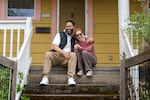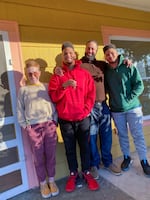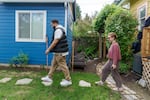
Randal Wyatt, left, and Annie Moss at Wyatt’s Albina neighborhood home in Portland, May 9, 2023. Wyatt purchased the three-bedroom home in 2020 from Moss in an off-market sale.
Kristyna Wentz-Graff / OPB
When Annie Moss decided to sell their second home in 2020, making the most money possible from the sale was not a top priority. It wasn’t even a priority at all.
“I wanted to sell it to a Black family,” said Moss, who is white. “And I didn’t care if I wasn’t maximizing my profit in doing that.”
And that’s exactly what they did. An off-market sale for the three-bedroom house in Portland’s Albina neighborhood closed on Dec. 4, 2020. The buyer was Randal Wyatt, a Black single father of two who grew up in a nearby neighborhood.
“I was skeptical the whole time up until the day we closed,” Wyatt said of the sale. “I was like, ‘This is gonna fall through. This isn’t gonna happen. This is too good to be true.’”
Moss did not know Wyatt before selling the home to him, but they were familiar with his work as a racial justice organizer. Wyatt bought the house for what was left on Moss’ mortgage: $230,000. At the time, real estate company Zillow estimated the fair market value of the home to be about $644,000.
That means Wyatt walked away with more than $400,000 in home equity. It was the most financial wealth he had ever accumulated in his life.
“I have assets now,” he said. “I have the ability to buy another home in the future.”
Moss, who originally bought the house to live in in 2013 for $406,000, lost out on what could have been more than $200,000 in profit. But the sale was never about making money. For Moss, this unique real estate transaction was about redistributing generational wealth via home ownership.
“Owning a home was part of my privilege and has really been a big factor in my life,” said Moss. “I wanted to do something that was based in that value and in all of the beauty that homeownership had brought into my life.”
The transaction between Moss and Wyatt inspired a more organized wealth redistribution effort in Portland. A group of volunteers who call themselves PDX Housing Solidarity Project helps connect people with ample resources to Black and Indigenous homebuyers in Portland. Amid a statewide housing crisis and in a city that has been historically hostile to Black, Indigenous and other people of color, the group sees their work as both mutual aid and as a form of reparations.

Annie Moss, left, on the porch of the Albina neighborhood home Moss sold to Randal Wyatt, (second from right) and his family in December 2020. Moss purchased the home in 2013, and sold it in 2020 to Wyatt, for what was left on the mortgage — well below the estimated fair market value of the home.
Courtesy of Randal Wyatt
PDX Housing Solidarity Project has three goals: educate people about racial disparities in homeownership, build the practice of wealth redistribution and support Black and Indigenous homeownership in Portland. The group launched in 2022 with a listserv and began to grow its community.
The project’s list of benefactors has grown to about 90 people, many from privileged backgrounds. All are interested in some aspect of wealth redistribution.
“Those of us who have benefited from racist systems historically are putting those dollars and those privileged opportunities back with the folks who should have had it in the first place,” said Lily Copenagle, a volunteer and organizer with the project.
Including the original sale between Moss and Wyatt, the project has helped seven Black or Indigenous families buy homes in Portland. Two more home sales are nearing completion. Not all the transactions the group helped facilitate mirror that of Moss and Wyatt’s direct home sale. Some homebuyers needed assistance navigating meetings with realtors and mortgage brokers during the homebuying process. Others received cash gifts or a no-interest loan to cover things like a down payment.
“That could look like $1,000 over Venmo,” said Copenagle, who emphasized that no money flows through the group at all. “It could also look like $20,000 directly from one person’s bank account to the homebuyer’s bank account. It’s going directly from individual to individual.”
PDX Housing Solidarity Project is not a nonprofit organization. Leaders with the group said it helps people engage in acts of redistribution and reparations. No money flows through the group at all.
In addition to volunteering her time to the project, Copenagle is also practicing wealth redistribution. One of the Black families the group is working with found a home they wanted to buy, but it was in such disrepair that no bank would finance the purchase. Copenagle and her husband decided to buy the house with cash and help the eventual owners with repairs. The couple took out $355,000 from their retirement account to buy the Arbor Lodge home and plans to sell to the family they’ve been working with for the same amount.
“What we can do right now is put some of our retirement funds on pause,” said Copenagle. “The impact that the small reduction in opportunity for wealth building for us has for another family is huge. It was a very easy decision for us.”
Copenagle expects the value of the home to be close to $450,000 once the repairs are finished and the house becomes financeable.
Trying to spread the wealth
Getting people to part ways with their money is probably the biggest hurdle the project has to jump over. But there are also some possible legal obstacles the group must dodge to keep from violating the Federal Fair Housing Act. Among other things, that law protects people from discrimination when buying a home. Race, the color of one’s skin and nationality are all protected classes. The home sales PDX Housing Solidarity works with specifically target Black and Indigenous homebuyers.
Still, there are ways to achieve wealth redistribution in real estate within the federal law.
“The law has an exception if you don’t use a realtor and you don’t advertise,” said Willamette University law professor Paul Diller. “This group apparently tried to avoid any problems with that by not advertising.”
Both Diller and organizers with the housing reparations group say unadvertised and below market value home sales are common among family members.
“If I want to sell my property to my brother, I don’t have to list it,” said Diller. “I can just make a deal with him, and that has the effect of excluding anybody who wasn’t my brother’s race or religion.”
Oregon also has its own fair housing law that is potentially more restrictive, said Diller. It states that realtors should not engage in any act that tries to evade the federal Fair Housing Act. But potential lawsuits over the type of home sales the project is assisting could be difficult to argue, said Diller.
“If I wasn’t interested in that house, I’m not going to have a claim,” said Diller. “If this is all happening behind closed doors, like a family transaction, I’m not sure who could even sue under that.”
Part of the intent of the federal law was to help eliminate racial disparities in homeownership, a key component for wealth generation and financial stability in the U.S. But the ownership gap has actually widened slightly since the law was enacted in 1968. Census data collected between 2015 and 2019 shows that the Black homeownership rate in Oregon is about 34%. That’s compared to a nearly 66% homeownership rate for non-Hispanic, white people.
Overcoming a history of racism
This disparity can be traced back to the very beginnings of the state, when white pioneers were promised 640 acres of land in the Willamette Valley in the form of a grant from the federal government in the mid-19th century, said Darrell Millner, a Portland State University professor and historian.
“Public policy decisions were made that privileged the whites who were arriving in that period,” said Millner. “And that particular head start that white Americans had in Oregon was multiplied from generation to generation.”
Millner said these policies disadvantaged every other racial group in the state. Black exclusion laws, redlining and urban renewal projects further discriminated against and displaced Black people in Oregon.
The Portland Housing Bureau has tried to boost Black homeownership in the city. It’s partnered with culturally specific community organizations like the African American Alliance for Homeownership and Portland Community Reinvestment Initiatives since 2009 to offer first time home buying classes, financial education, down payment assistance and foreclosure prevention aid among other services.
The housing bureau’s primary strategy to increase Black homeownership is its N/NE Preference Policy, which aims to assist displaced families from the city’s North and Northeast area to buy homes in those neighborhoods. The strategy launched in 2014 and has helped 110 families purchase homes, according to policy project manager Leslie Goodlow. She says 94 of those families identify as Black.
“It’s a race neutral policy,” said Goodlow. “But the areas of town that it applies to are the areas that had the most gentrification of Black people.”
Goodlow is Black and has lived in the Humboldt neighborhood of Northeast Portland for nearly 30 years. She has seen that gentrification first hand and noted that only two of her neighbors are Black.
Goodlow said the number one barrier to Black homeownership now is income. According to the city’s 2022 State of Housing report, the median annual income for a Black household in Portland is just over $36,000. The median annual income for a white household is nearly $78,000. The report found that the average Black household in Portland could not afford to buy a home in the city without becoming cost burdened; that means spending more than 30% of income on housing, not including taxes.
“The fact that any (Black family) is successful is amazing,” said Goodlow of the homebuying process. “It’s because of determination, not because anybody is doing anything to really try to address the core issues.”
With a budget of more than $14.5 million dollars, the bureau is hoping to support a total of 131 homebuyers through the preference policy.
“This was never intended to be reparations,” said Goodlow. “It was to provide opportunities for people who wanted to move back into Northeast Portland. That’s all it could be.”
Goodlow said Portland’s historically Black neighborhoods, like the Albina area, will never be what they were again. Millner agreed.
“I think people who talk about reparations have to understand that you can’t recreate the past,” said Millner.
Starting to build generational wealth
There are no immediate solutions to rebuilding Black wealth, Millner said. But that doesn’t mean the approach taken by the city of Portland or grassroots efforts like that of PDX Housing Solidarity Project should stop.
“I think at the very fundamental level, we first have to commit ourselves to be a society that is interested in truth and honesty and not trying to conceal the undesirable and unpleasant things about the past,” Millner said.

Randal Wyatt, left, shows Annie Moss, right, the accessory dwelling unit built in the backyard of Wyatt’s Albina neighborhood home in Portland, May 9, 2023. Wyatt purchased the three-bedroom home in 2020 from Moss in an off-market sale.
Kristyna Wentz-Graff / OPB
Educating white people about their privilege is a huge part of the work PDX Housing Solidarity does. And volunteers with the majority white group say this education component helps prevent them from falling into a white savior role.
“My role as an organizer is to move towards (white) people and get them to recognize that historically marginalized populations know what they need,” Moss said. “These communities will do what they need if we can just move resources in their direction.”
Wyatt is a case in point. Since buying his home from Moss in 2020, he’s added an accessory dwelling unit to start earning income from a tenant. The home itself has increased in value too. The median home price in Wyatt’s neighborhood is now $750,0000. He’s not planning on selling anytime soon. He plans to hold onto the home for his twin teenage sons.
Wyatt is now an advisor for PDX Housing Solidarity Project, and he wants to see the group’s wealth redistribution work scale up instead of waiting for a systemic approach to reparations.
“One thing our country has not done for white people who know the history and who want to do something to change the future is provide a clear path of reconciliation,” Wyatt said. “We can call it white guilt, but this country has a lot to be guilty about.”
